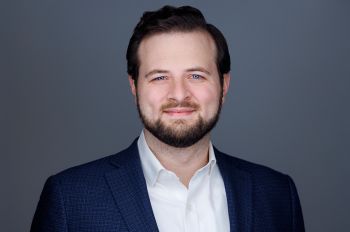Questioning the Law: Devin Ross ’23 Wins Racial Justice Writing Competition

“Being in law school, you’re just supposed to take it on face value that the ideas that built our country make for a system that can implement fairness,” says Devin Ross ’23, “but in many cases, something that might look and sound fair on its face is not when it’s put into practice.”
Ross is the winner of Chicago-Kent College of Law’s third annual A More Perfect Union racial justice writing competition for her paper titled, “Don’t Stop Me Now: An Analysis of Low-Level, Pretextual Traffic Stops and a Case for Banning Them.” The paper examines low-level traffic stops, which are those that are conducted for non-moving violations, such as a broken taillight or air freshener hanging from the rearview mirror.
“These low-level traffic stops are used pretextually and legally by the police to investigate drivers for other crimes that they might be committing,” says Ross. “This tends to have a disproportionate impact on racial minorities and communities with low socioeconomic status, because those communities are more likely to be overpoliced. Drivers are pulled over and investigated to see if they’re carrying drugs or guns, which leads to fines and a cycle of economic hardship and police violence in those areas.”
In the paper, she regularly references the case of Philando Castile, a 32-year-old African-American man who was killed in 2016 by a police officer 40 seconds after being pulled over in Falcon Heights, Minnesota—a suburb of St. Paul, Minnesota. Castile was pulled over at least 49 times in the 13 years prior to his death, usually for minor infractions.
“I see the way that police can affect the everyday lives of ordinary people,” Ross says. “For the better, when you need support in emergency aid, but for the worse, when you’re just trying to live your life and you are constantly surrounded by a hostile environment and over-policing.”
Twenty million Americans are pulled over every year. According to Ross, at least 87 of those stops turned deadly in 2022. One of those deadly incidents rose to national prominence as Ross was writing the paper. Tyre Nichols died on January 10, 2023, three days after being beaten by officers of the Memphis Police Department in Tennessee.
Ross closely followed the story.
“It was fresh in my mind as an issue that I was reading a lot about and that was concerning. I wanted to learn more about why this kept happening and how this cycle was continuing,” she says. “It led me down this long path of learning how these police practices are used, how impactful they are in certain communities, and that they’re not used proportionately across the country. They’re used in specific neighborhoods to target specific types of people in an unfair way.”
Ross conducted a survey of communities across the country that have taken measures to limit pretextual traffic stops.
“In some places it’s as simple as saying a police officer needs to have an articulable reason to pull someone over. It can’t be one of these reasons that they’ve now banned, like having an air freshener hanging from your mirror,” she says. “These stops that are routine should not be a death sentence for anyone. No one should be killed for having anything hanging from their mirror.”
During the course of her research, Ross uncovered studies conducted across the country that indicate low-level traffic stops can frequently turn violent and only end in an arrest or seizure of contraband in about 1–2 percent of cases. Despite that evidence, these stops are still legal throughout most of the country. Ross says she wants to see those laws change, which she admits is an odd place to be as a law student.
“When you’re in law school, you’re taught to question and analyze because that’s what you have to do for your clients, but you’re also taught that the law is the law and that’s what we follow,” Ross says. “Those are directly contradictory ideas, right? I think when you go to law school, you have to fight against that pressure to believe that the law is fair, that because this is the way that we've done it for 300 years, this is the way that it should be done, which is a difficult thing to do.”
Ross came to Chicago-Kent with an interest in civil rights. In fall 2023, Ross will be joining the civil litigation team at ArentFox Schiff in Chicago. She hopes to continue civil rights work in the future.
“You don’t always have to accept the way that things have been created as the way they should be. You can think about how this could be different,” she says. “There’s definitely a space in Kent to explore those ideas.”



